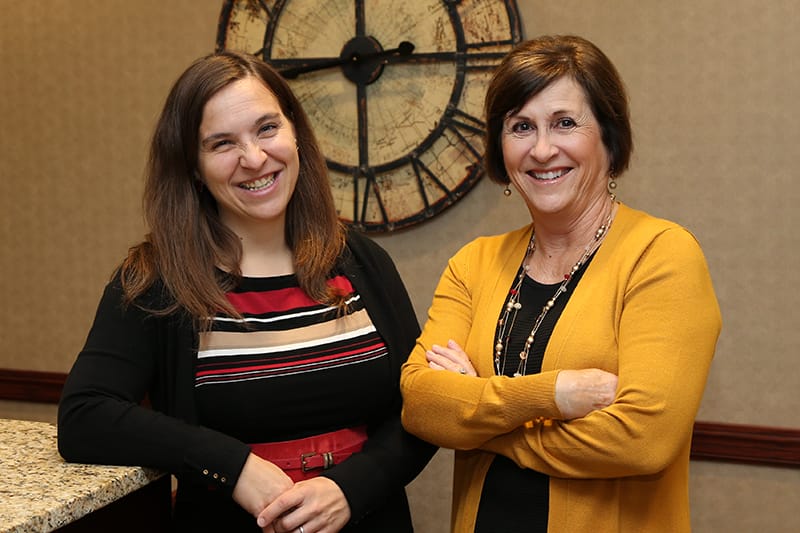Years of traditional physical exams confirmed what a West Des Moines executive already believed: she was healthy. One test changed her perspective.
Posted
by The Iowa Clinic on Thursday, November 8, 2018
 A family history of heart disease can increase your own risk of heart problems.
A family history of heart disease can increase your own risk of heart problems.
Kim Medici Shelquist knows that. Now more than ever.
"My father died suddenly of a heart attack at 65. His mother — my grandmother — had a triple bypass when she was 65. So I knew all of this was in the family history," she says. "But honestly, I felt good and really thought I probably wasn't going to have that problem. I assumed I would've had some type of symptom. But I really didn't."
An executive physical caught a heart condition other exams didn't.
No shortness of breath. No chest pain. No other symptoms that would indicate a heart problem.
Medici Shelquist felt fine. Her annual wellness exams said she was fine. Aside from high cholesterol, which she kept under control with medication, Medici Shelquist was living an active, healthy lifestyle with no other medical issues. She even ran the 2016 Living History Farms Race, a rugged off-road course where runners of questionable sense climb steep gully walls and wade through ice-cold creeks in Iowa's chilly November weather.
Six months after that race, Medici Shelquist — then 57 — took advantage of a new benefit offered by her employer, Homesteaders Life Company. As the senior vice president of planning and development for the West Des Moines funeral insurance company, she was able to get an executive physical for a comprehensive view of her health.
"We had just begun offering it and I went through it as soon as it was available. The opportunity to have everything done in one day sounded like a good thing," she says. "When you get to be my age, you usually go in for a physical and then have weeks of follow-up appointments to get this test done and that test done. I didn't really expect them to find anything."
But an advanced cardiac stress test did. A core part of The Iowa Clinic's Executive Health physicals, a stress test monitors the heart during physical activity. The results of the test concerned Dr. Lena Rydberg Freese, Internist at The Iowa Clinic in West Des Moines, and came as a surprise to Medici Shelquist.
"It was a pretty big shocker. The other tests all reaffirmed what I thought I knew, which was I was probably healthier than an average almost 60-year-old woman," Medici Shelquist says. "It was just one test. I would've never known otherwise."
The stress test showed signs of a heart attack.
That was the initial reaction of Dr. Rydberg. She recommended a consult with the cardiology team and found an opening the same day with a cardiologist at The Iowa Clinic. Twenty-four hours later, Medici Shelquist was undergoing an angiogram.
"I was anxious to find out what was going on and they got me right in for the angiogram," Medici Shelquist says. "In the end, they found out that that I did not have a heart attack. But I had two blockages that required stents and two that we'll have to watch."
"It was all so fast. I went in for the executive physical on Monday. And on Tuesday, I had the angiogram and they put the stents in," she says. "I'm extremely grateful that I had the opportunity to go through the Executive Health program and have that stress echo. My father knew he had heart issues but never felt as if they were bad. Then he had a massive heart attack and died. So, you know, these things are possibilities."
One year later and still no symptoms.
"I've talked to other people who had stents put in and feel better. I feel like a big dummy because I don't! I have always felt this good," Medici Shelquist says.
After two follow-ups with The Iowa Clinic Cardiology Department and a second executive physical in July 2018, Medici Shelquist feels as healthy as she always has. And her test results agree. She still isn't showing any heart symptoms, but the experience has made her more dedicated to maintaining her good health.
"I've tried to be more consistent in my exercise. I've tried to eat better. And I'm really dedicated to making sure I have a good executive physical every year," she says. "It's really about me being more aware of what's going on. If something doesn't feel right, I make sure to follow up on it because I really do believe that monitoring, in my case, was a significant factor in my health."
Medici Shelquist is also dedicated to staying active while doing what she loves — skiing, horseback riding, biking and enjoying the outdoors. She's happy that her condition hasn't kept her from any of those activities and that she found out about it earlier than her father and grandmother.
"Everybody has a family history. But I think when you understand a certain type of disease is prevalent in your family, it really gives you a better perspective for which to take care of yourself or to think about what kind of preventative care you might want to explore," she says.
"So that, for me, is something that came out of this. No, it didn't skip a generation. I hoped it would, but it didn't. It really affirmed for me the need for my two children to recognize what their family history is and to take advantage of quality health care because it does make a difference."